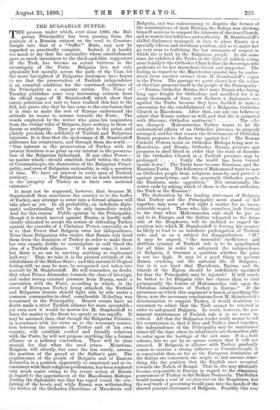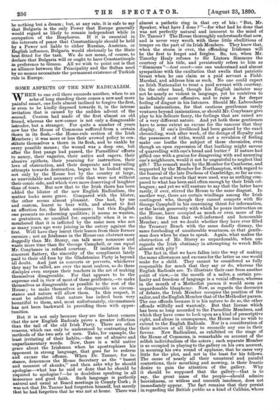THE BULGARIAN BUFFER.
process under which, ever since 1886, the Bul- THE garian Principality has been passing from the position of a Russian outpost on the road to Constan- tinople into that of a " buffer " State, may now be regarded as practically complete. Indeed, it is hardly too much to say that the nationality whose establishment gave so much uneasiness to the thick-and-thin supporters of the Turk, has become an actual buttress to the sovereignty of the Porte. Bulgaria lies, not only physically but morally, across the path of the Czar, for the more far-sighted of Bulgarian statesmen have begun to see that the preservation of Turkish independence is an essential condition for the continued existence of the Principality as a separate nation. The Times of Tuesday publishes some very interesting extracts from the official organ of M. Stambouloff, which show that astute politician not only to have realised this fact to the full, but prove also that he has come to the conclusion that it is time to make the rest of Europe understand the attitude he means to assume towards the Porte. The words employed by the writer who gains his inspiration from the virtual ruler of Bulgaria, have nothing in them of finesse or ambiguity. They go straight to the point, and plainly proclaim the solidarity of Turkish and Bulgarian interests. It is thus that the spokesman of M. Stambouloff addresses his countrymen, and through them the world :— " Our interest in the preservation of Turkey with its present frontiers is as great as our interest in the preserva- tion of the Bulgarian fatherland. If any other Power— no matter which—should establish itself within the walls of Constantinople, the destruction of the Bulgarian Princi- pality, and even of Bulgarian nationality, is only a question of time. We have an interest in every span of Turkish territory The Bulgarians are as much interested in the integrity of Turkey as in their own national existence."
It must not be supposed, however, that because M. Stambouloff thus announces his country to be the buffer of Turkey, any attempt to enter into a formal affiance will take place as yet. In all probability, an indefinite diplo- matic understanding will be the only immediate result. And for this reason. Public opinion in the Principality, though it is much moved against Russia, is hardly suffi- ciently educated to accept the notion of defending Turkey against the assaults of a Christian Power, especially as it is to that Power that Bulgaria owes her independence. Even those Bulgarians who realise that Russia only freed them from the dominion of Turkey in order to make them her own vassals, dislike to contemplate in cold blood the idea of a Turkish alliance. If it must come, it must ; but there is no use in meeting anything so unpleasant half-way.' That, we take it, is the present attitude of the inhabitants of the Balkan State ; and this natural if illogical feeling will, we may be sure, be recognised and taken into account by M. Stambouloff. He will remember, no doubt, that when Prince Alexander, towards the close of his reign, and under strong external pressure from Russia, made a convention with the Porte, according to which, in the event of European Turkey being attacked, the Turkish and Bulgarian Armies should fight side by side under a common commander-in-chief, considerable ill-feeling was occasioned in the Principality. Recent events have no doubt made a strict Turkish alliance far more acceptable ; yet even now it would be unwise for M. Stambouloff to force the matter to the front too openly or too rapidly. It may be assumed, then, that though the Bulgarian Premier, in accordance with his views as to the necessary connec- tion between the interests of Turkey and of his own country, will establish cordial and friendly relations with the Porte, he will not propose anything like a formal alliance or a military convention. There will be time enough for that when the need arises. Meantime, Bulgaria will silently, but none the less surely, assume the position of the guard at the Sultan's gate. The acquiescence of the people of Bulgaria and of Eastern Roumelia in a position apparently so unnatural and so in- consistent with their religious professions, has been rendered very much easier owing to the recent action of Russia in regard to the appointment of the Macedonian Bishops. During the diplomatic war that has raged round the con- ferring of the berats, and while Russia was withstanding the wishes of the Orthodox Christians of Macedonia and Bulgaria, and was endeavouring to deprive the former of the ministrations of their Bishops, the Sultan was showing himself anxious to support the interests of the true Church, and to restore her influence and authority. M. Stambouloff's skilful diplomacy managed, in fact, to place Russia in a specially odious and invidious position, and so to make her go very near to forfeiting the last remnants of respect in which she is held by the Bulgarian people. At the same time, he exhibited the Turks in the light of infidels acting more loyally to the Orthodox Church than the Sovereign who professes to be her staunchest friend and supporter. The feeling in regard to the Macedonian quarrel may be under- stood from another extract from M. Stambouloff's organ in the Press. The passage we quote shows how the action of the Czar presents itself to the people of the Principality : —" Russia, Orthodox Russia, that same Russia who during long ages fought for Orthodoxy and sacrificed for it so many thousands of lives, now declares a diplomatic war against the Turks because they have decided to make a concession for the establishment of a Bulgarian Orthodox Church in Macedonia. After that, can any one believe or admit that Russia wishes us well, and that she is animated with Slavonic, Orthodox sentiment ? The Wiles are changed. Mahommedan Turkey wants to let the ecclesiastical affairs of an Orthodox province be properly arranged, and for that reason the Government of Orthodox Russia prepares to declare war against her ! The Roman Catholic Powers insist on Orthodox Bishops being sent to Macedonia, and Russia, Orthodox Russia, protests and prepares to shed blood in order that the state of disorder of the Orthodox Church in a Turkish province may be prolonged Verily the world has been turned upside down ! The Turks have become Russians, and the Russians Turks. The followers of Mahommed want to save an Orthodox people from religious anarchy and protect it against proselytism, and the genuinely Orthodox people, the Russians, make opposition." Not unnaturally, the writer ends by asking which of these is the most orthodox, the Turk or the Russian?
The declaration by the leading statesman of Bulgaria that Turkey and the Principality must stand. or fall together, may seem at first sight a matter for no incon- siderable regret. Those who, like ourselves, look forward to the time when Mahommedan rule shall be put an end to in Europe, and the Sultan relegated to the Asian side of the Bosphorus, will be inclined to regard the position into which H. Stambouloff is forcing his country as likely to lead to an indefinite prolongation of Turkish rule, and so as a subject for disapprobation. "If," it may be argued, "the miserable inefficiency and shiftless tyranny of Turkish rule is to be perpetuated for all time, in order to safeguard the independence of Bulgaria, it becomes a question whether the price is not too high. It may be a good thing to prevent Russia crushing out the national life of Bulgaria ; but is it not hard that Macedonia, Epirus, and the islands of the 2Egean should be indefinitely sacrificed for fear the Principality may be injured ? It will surely be better to let Bulgaria take her chance than to rivet permanently the fetters of Mahommedan rule upon the Christian inhabitants of Turkey in Europe." If the premisses on which this argument is based, or anything like them, were the necessary conclusions from M. Stamboulotl's determination to support Turkey, it would doubtless be necessary to admit that the Turk cannot be retained in order to safeguard Bulgaria. In truth, however, the per- ma,nent maintenance of Turkish rule is in no sense in- volved. All that the Bulgarian leader really means to tell his countrymen is, that if they and Turkey stand together, the independence of the Principality may be maintained intact till the time when its inhabitants are themselves able to enter upon the heritage of the sick man. It is a bold scheme, but we are by no means certain that it will not succeed. If Bulgaria, in alliance with Turkey, gradually comes to exercise a strong influence at Constantinople, it is conceivable that, as far as the European dominions of the Sultan are concerned, she might at last assume some- thing like the position that the English once oecupied towards the Nabob of Bengal. That is, she mayt Adually become responsible to Europe in regard to the YeMaining possessions of Turkey in the Balkan Peninsula. 'Phi-Sultan would remain a sort of roi faineant on the Bospheins, but the real work of governing would pass into the hands of the shrewd peasant-statesmen of Bulgaria. Possibly this may be nothing but a dream ; but, at any rate, it is safe to say that Bulgaria is the only Power that Europe generally would regard as likely to remain independent while in occupation of the Bosphorus. If it is essential in the interests of peace that Constantinople should be held by a Power not liable to either Russian, Austrian, or English influence, Bulgaria would obviously be the State best fitted for the task. We do not mean, of course, to declare that Bulgaria will or ought to have Constantinople in preference to Greece. All we wish to point out is that an alliance between the Principality and the Sultan need by no means necessitate the permanent existence of Turkish rule in Europe.



































 Previous page
Previous page